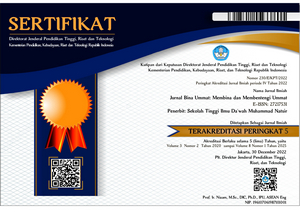?????? ?????? ?????? ?? ??????? ????????? ????????? ???????
DOI:
https://doi.org/10.38214/jurnalbinaummatstidnatsir.v6i1.162Abstract
This research departs from the discovery in the field of the weaknesses of some preachers who graduated from Islamic universities in several scientific insights. The aim of the study was to explore the educational curriculum at the sharia faculty at the Islamic University of Medina which produced scholars and preachers and analyzed it with the guide book Tsaqafah Daiyah by Yusuf Qardhawi. The conclusion states that the curriculum of the Sharia faculty is dominated by material related to Islamic Tsaqafah, namely fiqh, ushul fiqh, hadith, interpretation, besides there is also material such as morals at work, Islamic values. It's just that this material is not enough to realize the goals and standards of expected graduates, so there needs to be some curriculum material that needs to be added, including subject matter related to Tsaqafah waqi'iyah and scientific Tsaqafah
Published
Issue
Section
This work is licensed under a Lisensi Creative Commons Atribusi 4.0 Internasional.
Authors who publish with this journal agree to the following terms:
- Authors retain copyright and grant the journal right of first publication with the work simultaneously licensed under a�Creative Commons Attribution License that allows others to share the work with an acknowledgment of the work's authorship and initial publication in this journal.
- Authors are able to enter into separate, additional contractual arrangements for the non-exclusive distribution of the journal's published version of the work (e.g., post it to an institutional repository or publish it in a book), with an acknowledgment of its initial publication in this journal.
- Authors are permitted and encouraged to post their work online (e.g., in institutional repositories or on their website) prior to and during the submission process, as it can lead to productive exchanges, as well as earlier and greater citation of published work (See�The Effect of Open Access).




